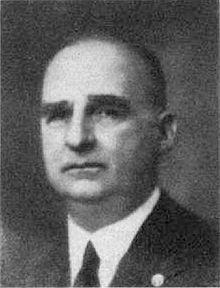| Revision as of 18:59, 4 June 2020 editJJMC89 bot III (talk | contribs)Bots, Administrators3,677,603 editsm Moving Category:Nazi leaders to Category:Nazi Party officials per Misplaced Pages:Categories for discussion/Log/2020 May 23#Category:Nazi leaders← Previous edit | Revision as of 01:31, 24 June 2020 edit undoJJMC89 bot III (talk | contribs)Bots, Administrators3,677,603 editsm Moving Category:German Nazi politicians to Category:Nazi Party politicians per Misplaced Pages:Categories for discussion/Log/2020 June 5#Nazi Party membersNext edit → | ||
| Line 18: | Line 18: | ||
| ] | ] | ||
| ] | ] | ||
| ] | ] | ||
| ] | ] | ||
| ] | ] | ||
Revision as of 01:31, 24 June 2020
| This article does not cite any sources. Please help improve this article by adding citations to reliable sources. Unsourced material may be challenged and removed. Find sources: "Hermann Kriebel" – news · newspapers · books · scholar · JSTOR (January 2007) (Learn how and when to remove this message) |

Hermann Kriebel (20 January 1876 in Germersheim – 16 February 1941 in Munich) was a retired lieutenant colonel and former Bavarian staff officer.

He fought with the Freikorps during the German Revolution of 1918–19; according to Time, as a member of the German 1919 Armistice delegation, his parting words were "See you again in 20 years." and in 1923 became the military leader of the Kampfbund, the league of nationalist and fighting societies that included Adolf Hitler's Nazi party and SA; the Oberland League; and Ernst Röhm's Reichskriegflagge. Kriebel was, with Hitler and Erich Ludendorff, the key figure in the 8–9 November 1923 Beer Hall Putsch and was convicted with Hitler in 1924, serving his sentence in the Landsberg prison.
After his release from prison, he maintained his ties with the Nazi party and the Oberland League but did not benefit from Hitler's rise to power. He became the German consul general in Shanghai.
External links
Categories:- Articles lacking sources from January 2007
- 1876 births
- 1941 deaths
- People from Germersheim
- National Socialist Freedom Movement politicians
- Nazi Party politicians
- Collaborators who participated in the Beer Hall Putsch
- 20th-century Freikorps personnel
- German diplomats
- German military personnel of World War I
- Nazis who served in World War I
- Military personnel of Bavaria
- Nazi Party officials
- Members of the Reichstag of the Weimar Republic
- Members of the Reichstag of Nazi Germany
- People from the Palatinate (region)
- German nationalists